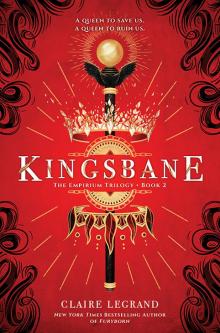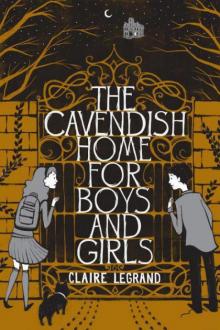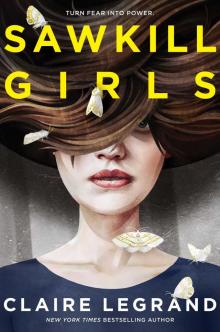- Home
- Claire Legrand
The Cavendish Home for Boys and Girls
The Cavendish Home for Boys and Girls Read online
Contents
Acknowledgments
Chapter 1
Chapter 2
Chapter 3
Chapter 4
Chapter 5
Chapter 6
Chapter 7
Chapter 8
Chapter 9
Chapter 10
Chapter 11
Chapter 12
Chapter 13
Chapter 14
Chapter 15
Chapter 16
Chapter 17
Chapter 18
Chapter 19
Chapter 20
Chapter 21
Epilogue
For my sixth-grade lunch table, who loved my scary stories
ACKNOWLEDGMENTS
Many people are involved in the making of a book, many more than one might originally think. “Is writing a book not simply a writer sitting at a desk and writing said book?” one might ask, befuddled. “Is that not how it is done?”
Why, yes, that is how it is done—but much more happens after that, and even before and during that, and it is those people, those doers of the much more, that I would like to take a moment and thank.
First, I must thank my agent, Diana Fox, who is much more than an agent and in fact could be considered superhuman. I am more grateful than I can say for her belief in me and my stories. Similarly, I would like to thank Pouya Shahbazian and Betty Ann Crawford.
Secondly, thank you to my brilliant editor, Zareen Jaffery, for so precisely and so vividly understanding my book and how to make it even better. Thanks must also go to the tireless team at Simon & Schuster Books for Young Readers, who helped bring The Cavendish Home for Boys and Girls to life: the intrepid Julia Maguire, Katrina Groover and Michelle Kratz, Justin Chanda, Michelle Fadlalla, and Lydia Finn and Paul Crichton. Especial thanks must go to designer Lucy Ruth Cummins and the outrageously talented Sarah Watts for making everything look so very pretty.
My first readers, Kendra Highley, Kait Nolan, Susan Bischoff, Lauren Hild, Amanda Johnson, and Malika Horton, encouraged me and, just as I knew they would, made me a better writer. Thanks to Joanna Volpe, as well as to Veronica Roth, Victoria Schwab, Nova Ren Suma, Leigh Bardugo, Stephanie Burgis, Kody Keplinger, Serena Lawless, the relentlessly supportive Apocalypsies, and all the other writers on Twitter and in the blogosphere who support, inspire, and amaze me.
Over the years, several teachers have taught me how to better read and write: Judy Young (first grade), George Uland (sixth grade), Susan Addy (ninth grade), Mike Crivello (twelfth grade), and Ian Finseth (college). And I cannot forget my music teachers, considering how important music became to Victoria and Lawrence in their adventures: Ellie Murphy, who made up stories with me, Dr. Marty Courtney, who taught me discipline, and John Holt, who understood when I needed to leave music behind.
My stepsister, Ashley Mitchell, and my cousin, Emily Jones, are voracious readers and exemplary fangirls. My family—all my aunts, my uncles, my cousins, my stepbrothers—cheer me on every day. I must specifically thank Grandpa, for deeming me “Scribbles,” and Grandma, for always having paper and colored pencils handy.
The warmest of thanks go to Brittany Cicero, who never let me give up; to Jonathan Thompson, who always believes and never judges. And to Beth Keswani, Melissa Drake, Amanda Tufano (of the aforementioned sixth-grade lunch table), Chris Siefken, Starr Hoffman, and Maureen Murphy, who have tolerated much radio silence on my part and still remain the dearest of friends. To Matt, who loves me—please never stop whirling me about in the air.
Thanks to Anna and to Dad, my very own WD, who love and support me in every way possible, even when that involves reading a manuscript so immense that it takes up two enormous three-ring binders.
For Drew, who is the most loving brother I could imagine, for Mom, who is my best friend and the ultimate heroine, and for Amos, who is a most excellent cuddler despite his overabundance of hair—thank you, always.
WHEN VICTORIA WRIGHT WAS TWELVE YEARS OLD, she had precisely one friend. In fact, he was the only friend she had ever had. His name was Lawrence Prewitt, and on Tuesday, October 11, of the year Victoria and Lawrence were twelve years old, Lawrence disappeared.
Victoria and Lawrence became friends shortly after Lawrence’s first gray hairs appeared. They were both nine years old and in fourth grade. Thick and shining, Lawrence’s gray hairs sprouted out from between his black, normal hairs and made him look like a skunk. Everyone made fun of Lawrence for this, and really, Victoria couldn’t blame them. Victoria decided that these hairs were a cosmic punishment for Lawrence’s inability to tuck in his shirt properly, use a comb, pay attention in class (he preferred to doodle instead of take notes), and do anything but play his wretched piano. Not that Lawrence was bad at piano; in fact, he was very good. But Victoria had always thought it an incredible waste of time.
After a few weeks of watching Lawrence’s gray hairs sprout thicker and thicker, and hearing everyone’s snickers, Victoria put aside her general dislike of socializing with, well, anyone, and decided that Lawrence would be her personal project. Obviously, the boy needed help, and Victoria prided herself on telling people what to do with themselves. Sacrificing her valuable time to fix Lawrence would be a gift to the community of Belleville. “How charitable of you, Victoria,” people would say, and beam at her and wish their children could be like her.
So, at lunch one day, Victoria marched from her lonely table to Lawrence’s lonely table and said, “Hello, Lawrence. I’m Victoria. We’re going to be friends now.”
Victoria almost shook Lawrence’s hand but then thought better of it because she feared he might very well be infested with lice or something. Instead, she sat down and opened her milk carton, and when Lawrence looked at her through his skunkish hair and said, “I don’t really want to be your friend,” Victoria said, “Well, that’s too bad for you.”
Over the years, Victoria pushed herself into Lawrence’s life and was pushed out of it when he decided that enough was enough, and then pushed herself back in, and finally they were really, truly friends, in an odd sort of way.
Every weekday morning, they met at the crossing of Silldie Place (Victoria’s street) and Bourdon’s Landing (Lawrence’s street) and walked together to school. Most mornings, their conversation went something like this:
“Honestly, Lawrence,” Victoria would say, leading him briskly down the cobbled walk, for Victoria never walked anywhere without extreme purpose, “can’t you tuck in your shirt?”
Sometimes it would be, “Can’t you comb your hair?” or “How do you manage to get past your parents with those ugly shoes?” or “Did you finish your essay on the Byzantine Empire for extra credit like you were supposed to, or did you spend the entire weekend playing that silly piano?”
And Lawrence would roll his eyes or cuff her on the shoulder and say, “Good morning to you, too, Vicky,” which Victoria hated. She abhorred nicknames, especially that one. She also abhorred how Lawrence was always chewing on something, like a toothpick or pen or whatever nasty things he pulled from his pockets.
Nobody liked Lawrence, because he never really bothered to make friends. He lived in a dreamer’s world of ivory keys and messy shirts, unconcerned with the people around him. Those gray hairs of his didn’t help matters. He didn’t seem to mind what anyone thought of him, though. He didn’t seem to mind about much at all except for his piano—and Victoria. For Victoria’s twelfth birthday, Lawrence had written her a long letter and read it aloud right in front of her. It was full of jokes and funny stories, at which Victoria tried not to laugh too loudly, and that was all well and good, till the end happened.
“Honestly, Lawrence,” Vi
ctoria would say, . . . “can’t you tuck in your shirt?”
“. . . and so what I really mean is,” finished Lawrence, his face turning quite red, “sometimes, the counselors or professors or Mom and Dad say, ‘Don’t you care that you don’t have many friends?’ And I say, ‘Not really. Because I have Vicky.’ ”
Then Lawrence had folded up the letter and shoved it in his pocket. “So . . . you know. I mean, I really like that we’re friends is what I’m saying. Happy birthday.”
Victoria had been so embarrassed that she had said, “Well . . . you . . . I . . . that’s very nice,” and then ignored him for the rest of the week. She never allowed herself to think about why she’d felt so embarrassed. Such thoughts were messy. Friends were messy, which was why Victoria avoided them at all costs (except for Lawrence, but he was just a charity case, a project, and certainly—certainly—nothing more than that). Victoria hated messes. She hated distractions. Friends were the worst distraction of all.
Victoria began every day with a plan, and friends were simply not a part of it.
The Monday before Lawrence disappeared, Victoria awoke at half past six, just as she did every weekday—not one minute before, and certainly not one minute after. Tardiness was an offensive concept. She showered and dressed in her Academy uniform, white blouse and gray pleated skirt pressed stiff and straight. She sat at the vanity her parents had ordered custom from Italy, and brushed her blond curls till they gleamed. Everything about Victoria gleamed.
On her way out, she paused at the bedroom door, as she so liked to do, and inspected everything—vanity and desk; glittering chandelier, white canopy bed; a wall of mirrors and a ballet barre for practicing her exercises; a wall of shelves opposite her bed, floor to ceiling, containing pretty, labeled boxes where Victoria kept all her bookmarks and books and lotions and paper and pens and postcards and ribbons, because that way she never had to see even the tiniest bit of clutter. Her pride and joy were the spotless white walls and white carpet, marred by neither pictures nor smudges.
On most days, Victoria would gaze upon all this and feel a hot swell of satisfaction in her chest. But the Monday before Lawrence disappeared, Victoria felt no such satisfaction. Everything looked just as it should, shining with perfection. Morning bathed the room in clean, white light. Victoria’s schedule hung above her desk, clearly marking her tasks and lessons for that week. Piano lessons, ballet lessons, painting lessons, and French lessons filled her evenings with blocks of orderly color.
But below that schedule sat her academic report, and when Victoria forced herself to look at it, nausea overwhelmed her. On the crisp manila paper, in black text as immaculate as Victoria’s own handwriting, she saw the three A’s in Letters and Literature, History of the World, Intermediate French—and the one grotesque, intolerable B. She received a B in music class, of all things.
Victoria had never received a B in her entire life. She knew that some of her classmates yearned for B’s. They were glad for B’s. They jubilated at B’s. But to Victoria, a B was even worse than mud on her carpet or a tangle in her perfect blond curls.
She walked to the desk, her breath trembling, folded the report into its envelope, pressed the golden Academy seal over the flap, and shut the report away in the bottommost drawer. It had a keyhole she had never seen the point of using before now, for she had never had a secret worth hiding. She found the appropriate key in the box labeled MISCELLANEOUS along with the other things she hadn’t much use for, locked the drawer, and put the key back in its proper place.
She turned and stared at the closed drawer. She was supposed to get her parents’ signatures and return the report by the following Monday morning, but the idea of admitting this catastrophe to anyone horrified her.
“Just breathe, Victoria,” she said, putting a hand to her heart.
She caught the time on the silver clock beside her bed. 7:04. She had dawdled.
She hurried down the staircase, past her father’s art collection on one side and the sweeping view of her mother’s rose gardens on the other. She arrived at the kitchen in a bit of a flurry. Her father looked up from his newspaper, and her mother looked up from her magazine, for Victoria was seldom in a flurry.
“Good morning, Mother, Father,” Victoria said. She could not look at her parents; if she met their eyes, they might see the B on her face. They would be disappointed in her, which they had never been before. Victoria didn’t know what it felt like for anyone to be disappointed in her, but she could imagine it based on what she had heard others say. Mr. and Mrs. Wright would sigh and shake their heads, and when they went out for dinner, they would not brag to the next table about their perfect daughter. They would not even go out at all; they would be too ashamed.
Victoria swallowed hard. When she said, “Good morning, Beatrice,” it sounded a bit funny.
Their old housekeeper, Beatrice, raised a slender white eyebrow and passed Victoria a bowl of fruit and a slice of toast with jam.
“Good morning, Victoria,” said her mother.
Miranda Wright did not work in the conventional fashion, but she supervised Beatrice and the gardener who tended the roses, and was an expert shopper. She kept her magazines in pretty, labeled boxes in her closet. She wore fancy aprons in the kitchen even though she didn’t cook, because she looked lovely in aprons, and that’s what one is supposed to wear in the kitchen, after all. Miranda Wright was beautiful and stylish with penny-colored hair. She lunched with important Belleville ladies and knew everyone in town, even those about whom she would whisper to Victoria as having “questionable taste.” Her high heels clicked just so. A member of the neighborhood homeowners’ association, she loved making everything around her just so, too. Whenever Victoria looked at her mother, she felt almost as proud as she did when adding another medal to her MEDALS box, which held years’ worth of honor roll pendants and spelling bee ribbons and “Top of the Class” certificates.
But she could not look at her mother today.
“Good morning, Victoria,” said her father.
Ernest Wright was a successful, middle-aged lawyer, and he looked exactly like a successful, middle-aged lawyer should look. He drank mild mint tea, spent thousands of dollars on dental work so that his teeth would be perfect and white and gleaming, and shared his wife’s fascination with trendy diets. His most triumphant success in life was the sleek, modern swimming pool he’d had installed in their backyard, although no one ever used it. He was considering tearing it out and putting in another one, because the Nesbitts’ new pool was even sleeker and more modern than his. Mr. Wright knew everyone in town, too, and was one of the richest men in Belleville, and some people were even afraid of him because he was so rich and perfectly toothed. Few things could impress him, but Victoria had always managed it.
And now she had failed him. She had failed them both. The realization filled her belly with ice.
They must never find out, Victoria thought.
With the good-mornings said, Mrs. Wright flipped another page in her magazine, and Mr. Wright returned to his newspaper. To them, everything was just as it should be in the Wright house. Flushing with shame, Victoria returned to thoughts of the B in music class. She thought about it so much that she couldn’t finish her breakfast and excused herself despite Beatrice’s protests. Grabbing her book bag from the coat closet, she rushed out the front door.
Like every other street in Belleville, Silldie Place boasted cobbled walks, large trees, tall hedges, lampposts, and iron gates. Houses had high, peaked roofs and pretty white gables and impressive brick chimneys inlaid with stone birds. Yards were luxurious and groomed and spotless. If someone’s yard began to wilt, they heard about it at once. Mrs. Wright would leave a crisp, red warning note in their mailbox.
The largest house and grounds in the whole town lay at the end of Victoria’s street, on a rolling estate with trees so old you could hear them creaking two streets over, and a pond and a long, gray brick garden wall. This was Nine Silldie Place, t
he Cavendish Home for Boys and Girls. Victoria didn’t like to think about the Home. She didn’t even like to go near it. Orphanages held a distinctly untidy connotation. Although she had to admit she had never actually seen any orphans doing such things—or any orphans near the Home at all, for that matter—she couldn’t help imagining a passel of them, dirty-fingernailed and smelly, running amok and knocking all her labeled boxes to the floor.
Shoving that horrifying image out of her head, Victoria marched along, growing angrier about her B with every step. Surely Lawrence hadn’t gotten a B. Surely Lawrence had received not only an A in music class but also another of old Professor Carroll’s glowing essays about talent this and prodigy that, urging Mr. and Mrs. Prewitt to send Lawrence to the city for more advanced study.
By the time she reached the Prewitt house at Two Bourdon’s Landing, Victoria found herself wishing, rather viciously, that Lawrence would go live somewhere else for a while. Every time she saw him now, she would be reminded of her failure.
She rapped with the knocker till the door opened to reveal Lawrence, hunched over and frowning. Of course his shirttails hung loose. Of course his tie wasn’t tied.
“You’re early,” Lawrence said, flicking his gray eyes back over his shoulder, into the dark house.
Victoria scowled and stalked past him into the living room, where the Prewitts kept their ancient piano. It wasn’t good enough for Lawrence. On her reasonable days, Victoria knew this. On her reasonable days, Victoria wondered if perhaps Lawrence should go to the city to study his music, even though the Prewitts would never let him. They were dental surgeons and wanted Lawrence to follow in their footsteps. Music was supposed to have only been part of a well-rounded education. All Belleville children needed culture, after all.
But when Lawrence’s piano lessons turned into an obsession and he spent hours practicing Mozart sonatas and Chopin preludes and Gershwin solos till the neighbors complained, the sensible Prewitts realized they had a serious problem. They had never meant for this to happen.

 Furyborn
Furyborn Queen of the Blazing Throne
Queen of the Blazing Throne Lightbringer
Lightbringer Kingsbane
Kingsbane Cavendish Home for Boys and Girls
Cavendish Home for Boys and Girls The Year of Shadows
The Year of Shadows Some Kind of Happiness
Some Kind of Happiness The Cavendish Home for Boys and Girls
The Cavendish Home for Boys and Girls Sawkill Girls
Sawkill Girls Foxheart
Foxheart Summerfall: A Winterspell Novella
Summerfall: A Winterspell Novella